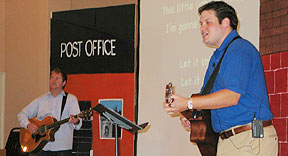BaptistWay Bible Series for November 11: Live in response to Godâs mercy
Posted: 11/02/07
BaptistWay Bible Series for November 11
Live in response to God’s mercy
• Romans 12:1-8
Christ Church, Rockwall
Jesus tended carefully to the bodies of others in physical acts of healing and through the ways he showed compassion to unlovable, untouchable people. He taught us to honor him by honoring other people’s bodies: “I was hungry, and you gave me something to eat. I was thirsty, and you gave me something to drink. I was naked, and you clothed me. I was in prison, and you visited me.”
The impact of these words is not because they are nice ideas. They are meaningful, because they are matters of life and death for the body.
Our bodies are the ways God gets to us. We don’t know what it’s like to be a person apart from what it is to be a person in our bodies. That’s why it is so difficult to imagine who we are apart from our bodies, because it is the only kind of existence we know: The way her eyes squint when she smiles; the way her nose crinkles when she laughs; the way he uses his hands when he talks; the way his voice cracks when he’s mad. We only know each other as embodied human beings. Yet one of the great questions Christians across time have struggled with is: Is a body something we have? Or is a body someone we are?
The Apostle Paul must have lived with this question. Of course, Paul was a man of his time. He was influenced, just as we are, by cultural preferences, practices and tastes. Greek philosophy pitted the body over against the soul. It set up a warring between good and evil— good being the soul and evil being the flesh.
He knew all too well his spirit was willing but his flesh was weak. So he says, “The things I want to do, I do not do. The things I don’t want to do, I do. Wretched man that I am! Who will rescue me from this body of death?” And yet in the same breath he could ask, “Do you not know that your body is a temple of the Holy Spirit? Present your bodies as a living sacrifice … .”
Seems Paul has a love/hate relationship with the body. Many of us have a love/hate relationship with our bodies, too. We know them as enemies more than friends. No matter what size or shape we are, there are things about our bodies we’d like to change: flatter stomachs, longer legs, chiseled abs, a smaller nose, bigger biceps.
We are constantly confronted in our culture by body images. The gospel of GQ and Glamour and Cosmo publish the glossy, sculpted splendor of cover page queens and kings. And with only a little extra time in the gym and a little help from an airbrush, you too can attain celebrity levels of physical flawlessness. This fixation on outward appearances only breeds inward anxiety and sometimes shame because we are respecting an image of the body created by Cosmo and not Christ.
Scripture offers an alternative witness to the magazine madness. Genesis says we are “made in the image of God.” The Psalms are even more emphatic: “We are fearfully and wonderfully made.”
Honoring the body is a Christian practice built upon the foundation of creation. Genesis affirms that God judged creation good. God made every body in the divine image. God shaped human bodies out of the dust of the earth. And God so loved the human body, God decided to become one. In this way, Jesus leaves with us a different kind of body image altogether; one that endured the shaming of the cross—naked and vulnerable, pierced by pain and suffering.
Maybe this is why the earliest Christians began to think of themselves as the body of Christ; a group of broken bodied people seeking to be the fresh flesh of the gospel to each other and the world after Jesus was gone.
Our concern over body image translates to our spiritual body image as a church, too. The church must answer important questions: Will we be shaped by the latest fads, trends and styles that reflect the dominant culture of our time, or will we seek to be an alternative culture that makes room for the kingdom of God to break in to our lives? The alternative culture of the church is a place where we can be at home inside our own skin; not ashamed of our weaknesses and vulnerabilities. We can offer these as gifts to other fellow strugglers along the way.
Notice that Paul uses the plural word “bodies” when he says, “Present your bodies a living sacrifice unto God.” This means each one of us has the opportunity to make ourselves available to God as the church’s one living sacrifice.
The shape the body of the church takes is the well-sculpted shape of compassion and generosity and openness to receive the shame and pain and joys of others. This means that when we gather week after week, we are gathering with others who are trying to take the shape of their lives from the cross. What is shaping to church bodies are the practices of prayer and singing and silence and Communion and welcoming new little babies into this world with gentleness and care.
And as we take care of each other in our joy and in our pain and through our struggles, we are modeling to the world a different kind of body image. It is one that takes in people like you and me with all of our warts and wounds, so that we might be transformed into the image of God’s only begotten Son. And thanks be to God, that is the only kind of body image that could possibly be good and acceptable and perfect.
News of religion, faith, missions, Bible study and Christian ministry among Baptist churches, in Texas, the BGCT, the nation and around the world.


